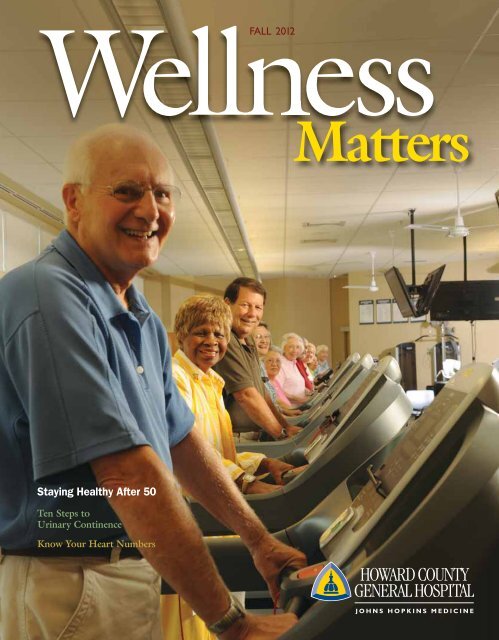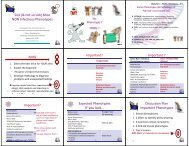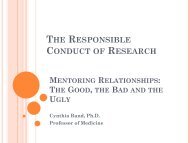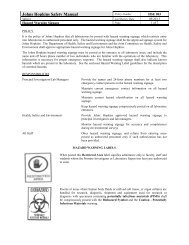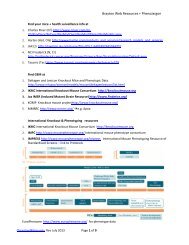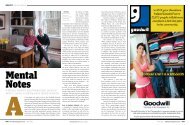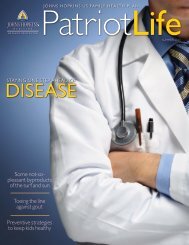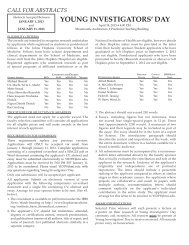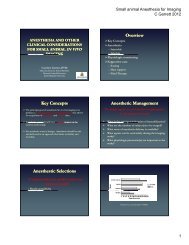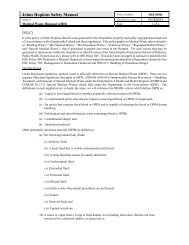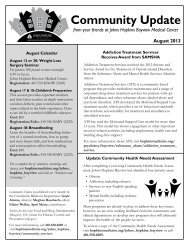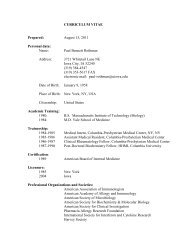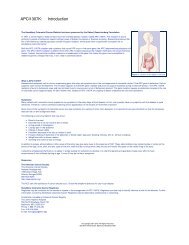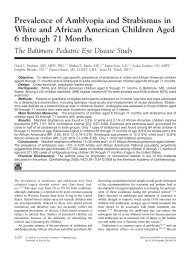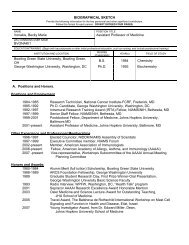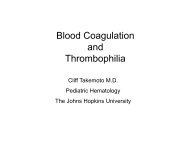Staying Healthy After 50 - Johns Hopkins Medical Institutions
Staying Healthy After 50 - Johns Hopkins Medical Institutions
Staying Healthy After 50 - Johns Hopkins Medical Institutions
You also want an ePaper? Increase the reach of your titles
YUMPU automatically turns print PDFs into web optimized ePapers that Google loves.
Wellness<br />
FALL 2012<br />
<strong>Staying</strong> <strong>Healthy</strong> <strong>After</strong> <strong>50</strong><br />
Ten Steps to<br />
Urinary Continence<br />
Know Your Heart Numbers<br />
Matters
President’sMessage<br />
Dear Friends,<br />
During these warm months, many of us find ourselves outdoors enjoying all that Maryland<br />
and Howard County have to offer. Such was the case in April when more than 2,<strong>50</strong>0 individuals<br />
came together to embrace healthy living and raise awareness about cancer through TriColumbia’s<br />
inaugural Athleta Iron Girl Columbia Half Marathon. I want to thank TriColumbia and its<br />
CEO and founder Robert Vigorito for their generous $25,000 donation to the Claudia Mayer<br />
Cancer Resource Center; these funds will help us provide valuable services to our cancer<br />
patients and their families when they need it most. Equally impactful was watching people<br />
ages 8–75 participate. Among the crowd was 1984 Olympic gold medalist Joan Benoit<br />
Samuelson, who, at 54, is proof that taking care of yourself as you age is worthwhile.<br />
Joan will return for the April 28, 2013, Athleta Iron Girl Columbia Half Marathon.<br />
As Howard County has the fastest growing 65 and older population in Maryland, HCGH is<br />
committed to meeting the health care needs of our citizens, enabling them to age in place. On<br />
the following pages, we share information about screenings you should consider once you turn<br />
<strong>50</strong> and invite you to join us for the free <strong>50</strong>+ Expo on October 19 at Wilde Lake High School.<br />
With age, we sometimes like to overlook birthdays. However, we, at HCGH, are looking<br />
forward with excitement as we mark 40 years of providing award-winning health care to our<br />
community. Keep an eye out for news about events held throughout 2013 to recognize this<br />
milestone. We also invite you to share your memories of the care you and your family have<br />
received at the hospital throughout the years by emailing contactus@hcgh.org.<br />
Speaking of award-winning health care, I am pleased to announce that Becker’s Hospital<br />
Review recently selected HCGH as one of the “100 Great Community Hospitals in the U.S.”<br />
based on criteria that included clinical excellence, community involvement and various other<br />
efforts. It is an honor to be selected and a greater honor to be the only hospital in Maryland<br />
on the list. In addition, U.S. News & World Report ranked HCGH as one of the top<br />
hospitals in Maryland, citing outstanding achievement in eight major clinical specialties.<br />
Read more about these awards on page 14. Finally, for the third consecutive year, a national<br />
health care rating organization ranked our Emergency Department as one of the top five<br />
percent in the U.S.<br />
All of the aforementioned recognition would not have been possible without the caring,<br />
dedication, skill and commitment of the more than 3,000 people on our team, including<br />
physicians, nurses and other caregivers, support staff, and the hundreds of community<br />
volunteers who donate their time and talents. I sincerely thank everyone for their hard<br />
work and passion for helping others.<br />
As we look back and take stock of the countless ways we have grown that have allowed<br />
us to continue to serve those who live and work in our community, we realize that it has<br />
been our privilege to be a part of your lives. We thank you for your<br />
ongoing support of the hospital and look forward to caring for you<br />
and your family for years to come.<br />
Sincerely,<br />
Victor A. Broccolino, President and CEO<br />
Howard County General Hospital<br />
Wellness Matters is published by Howard<br />
County General Hospital, a private, not-forprofit,<br />
health care provider, and a member<br />
of <strong>Johns</strong> <strong>Hopkins</strong> Medicine. Your physician<br />
should be consulted in regard to matters<br />
concerning the medical condition,<br />
treatment and needs of your family.<br />
Marketing and Communications<br />
Susan Case, director<br />
Writing/Editing/Design<br />
Bonnie Heneson Communications<br />
Custom Photography<br />
Carl Caruso<br />
Jill Myers<br />
Wellness<br />
Volume 16, No. 3 Fall 2012<br />
CONTENTS:<br />
3<br />
4<br />
9<br />
10<br />
14<br />
15<br />
16<br />
Board of Trustees<br />
Evelyn T. Bolduc, chair<br />
Peter J. Rogers, Jr., vice-chair<br />
W. Brian McGowan, treasurer<br />
Ann B. Mech, J.D., R.N., secretary<br />
Vivian C. Bailey**<br />
Victor A. Broccolino*<br />
Marvin P. Davis, M.D.<br />
Adinarayana Divakaruni, M.D.<br />
George L. Doetsch, Jr.<br />
Clarita Frazier Dawson, M.D.*<br />
Brian Gragnolati<br />
Nicholas W. Koutrelakos, M.D.*<br />
Turning <strong>50</strong><br />
The importance of<br />
annual exams and<br />
screenings to discuss<br />
with your physician 6<br />
Matters<br />
Ten Steps to Fight Urinary Incontinence<br />
An overview of the causes, risk factors, prevention<br />
tips and treatment options available at HCGH<br />
Wellness Classes<br />
Diabetes and Wound Healing<br />
Are you at risk for a diabetic wound?<br />
Giving Matters<br />
Thanking our donors for supporting HCGH<br />
and its mission<br />
Hospital News<br />
Know Your Heart Numbers<br />
Understand what your blood pressure and cholesterol<br />
levels mean to your heart health<br />
Mark Your Calendars<br />
Pictured on front cover: Exercise is an important part of staying healthy.<br />
Thank you to John Heiss, Ruby Ashby, Joseph Slert, Peggy-Ann Duke, Rita Ryerson,<br />
Joanna Brickley, Mario Alves, Margaret Tankersley, Aline Feldman, and Portia Huber.<br />
........Suggest an Article........<br />
Is there a medical topic you are interested in learning more about?<br />
We welcome your ideas.<br />
Please send your article ideas to contactus@hcgh.org.<br />
Harry L. Lundy<br />
Robert T. Manfuso<br />
Ronald R. Peterson*<br />
David Powell<br />
Alton J. Scavo<br />
Mary Ann Scully<br />
G. Daniel Shealer, Jr., Esq.<br />
Paul G. Skalny, Esq.<br />
Sue Song, APRN-PMH, Ph.D.<br />
David S. Williams<br />
Kayode Williams, M.D.<br />
W. Gill Wylie<br />
*Ex-Officio Trustee **Trustee Emeritus<br />
Howard County<br />
General Hospital, Inc.<br />
Victor A. Broccolino, president/CEO<br />
Howard Hospital Foundation<br />
Paul G. Skalny, Esq., chair<br />
Howard County<br />
General Hospital<br />
Professional Staff<br />
Clarita Frazier Dawson, M.D., president<br />
Volunteer Auxiliary<br />
Alicia Slahetka, president<br />
Please direct questions, suggestions and comments regarding Wellness Matters to the Marketing and Communications Department at 5755 Cedar Lane, Columbia, MD 21044-2912<br />
Phone: 410 -740 -7810, Hospital Information: 410 -740 -7890, TDD: 410 -740 -7990.
RESTROOMS<br />
Do You:<br />
Leak urine before<br />
you make it to the<br />
bathroom?<br />
Have a sudden urge<br />
and cannot delay<br />
urination?<br />
Wear pads to<br />
protect your clothes?<br />
Frequently limit<br />
your fluid intake<br />
when you are away<br />
from home?<br />
Leak urine when<br />
you laugh, cough,<br />
sneeze or exercise?<br />
If you answered“yes”,<br />
you may have urinary<br />
incontinence (UI), the<br />
involuntary loss of urine<br />
from the bladder. This<br />
affects about 33 million<br />
Americans—both men<br />
and women of all ages—<br />
according to the<br />
National Association<br />
for Continence. UI is a<br />
treatable, often curable<br />
symptom, not a disease.<br />
Ten Steps to Fight<br />
Urinary Incontinence<br />
Types of UI<br />
According to Dr. Jennifer Bepple, a urologist on staff at Howard County General Hospital, there are four main<br />
types of incontinence: stress, urge, mixed and overflow. “Stress incontinence occurs due to increased abdominal<br />
pressure when you cough, sneeze, laugh or exercise. Urge incontinence occurs when you cannot delay urination,”<br />
explains Dr. Bepple. “Mixed incontinence is a combination of stress and urge incontinence. The least common form,<br />
overflow incontinence, happens when the bladder is overfull.”<br />
Can You Prevent UI?<br />
“There are several risk factors for developing UI including obesity, smoking and age,” notes Dr. Bepple. “Women<br />
are also twice as likely to experience incontinence compared to men. In addition, there are certain foods, drinks and<br />
medications that can trigger, cause or worsen overactive bladder. The good news is there are steps you can take to<br />
prevent, relieve or cure your incontinence symptoms.”<br />
Ten Steps to Continence:<br />
1.<br />
2.<br />
3.<br />
4.<br />
5.<br />
Avoid foods and drinks high<br />
in spices, sugar and acid.<br />
Cut down on<br />
caffeinated drinks.<br />
Cut back on<br />
alcoholic beverages.<br />
Lose weight.<br />
Stop smoking.<br />
6. Exercise.<br />
“As other diseases and conditions can cause incontinence, it’s important to talk to your physician if you are<br />
experiencing bladder symptoms in order to determine the cause and explore your treatment options,” says Dr. Bepple.<br />
What are the Treatment Options?<br />
If lifestyle changes do not resolve your symptoms, your physician may offer additional<br />
treatment options based on the type of urinary incontinence you have.<br />
According to Dr. Bepple, patients with stress incontinence can benefit from surgical<br />
procedures to either create a sling to support the bladder or inject a bulking agent.<br />
During the sling surgery, the surgeon uses a synthetic material to help support your ure-<br />
thra (the tube carrying urine from the bladder to the outside of your body). Through another surgical option, urethral<br />
bulking agents are injected into the wall of the urethra to help address one of the causes of stress incontinence—weak<br />
urethral sphincter muscles that help open and close the urethra.<br />
“Those with urge incontinence may benefit from medications as well as dietary and behavioral changes. Some<br />
patients may see relief through an implantable device, which is like a pacemaker for your bladder,” says Dr. Bepple.<br />
“Through this surgically implanted device, electrical pulses are delivered to the nerves that supply the bladder, reducing<br />
the number of urinary accidents. Finally, for a small number of patients, Botox injections into the bladder muscle<br />
may be appropriate.<br />
“Incontinence can affect your quality of life, but you do not have to suffer with the symptoms,” says Dr. Bepple.<br />
“Talk to your doctor and discuss the many ways to manage or treat your UI.”<br />
7.<br />
8.<br />
9.<br />
10.<br />
Discuss your medications with your doctor as common<br />
medications, including those prescribed to treat high blood<br />
pressure, depression and sleep issues, can trigger UI.<br />
Do pelvic floor muscle exercises, also referred to as<br />
Kegel exercises. These strengthen muscles that help<br />
control urination, which can weaken due to pregnancy,<br />
childbirth, obesity or aging.<br />
Talk to your physician if you have a urinary tract infection,<br />
an enlarged prostate, prostate cancer, multiple sclerosis,<br />
stroke, spinal injury, Parkinson’s disease or other<br />
neurologic condition.<br />
Avoid constipation, as straining to empty your<br />
bowels weakens your pelvic floor muscles and<br />
makes urine leakage worse.<br />
For a referral to a urologist on staff, visit “find a doctor” on hcgh.org. To learn more about incontinence, visit http://bit.ly/Mfx396.<br />
Dr. Jennifer Bepple is<br />
a urologist with Central<br />
Maryland Urology in<br />
Columbia. She specializes<br />
in pelvic floor disorders<br />
and incontinence.<br />
Appointments:<br />
410 -772-7000.<br />
FALL 2012 Wellness Matters [ 3
special<br />
.............<br />
The Elbow’s Connected to<br />
the Arm Bone...<br />
When you have severe pain in the elbow<br />
joint, it can really limit daily activities.<br />
Learn about tennis elbow, nerve compression,<br />
fractures, arthritis, and medical and<br />
surgical treatment options. Presented by<br />
orthopedic specialist Khurram Pervaiz, M.D.<br />
9/12, 7–9 p.m. Free.<br />
It’s Hip to Be Pain Free<br />
Hip pain can make you feel years older.<br />
Review causes and treatments for hip<br />
pain and the latest surgical approaches<br />
in hip replacement surgery. Presented by<br />
orthopedic specialist Charles Mess, M.D.<br />
10/16, 7–9 p.m. Free.<br />
Knee Deep in Pain<br />
If a painful knee joint is preventing you from<br />
having an active life, attend this presentation<br />
to learn ways to reduce knee pain and get<br />
back on your feet! Hear about knee injuries<br />
and degenerative conditions such as arthritis,<br />
and medical and surgical treatment<br />
including arthroscopy and knee replacement<br />
surgery. Presented by orthopedic specialist<br />
Daniel Tang, M.D. 10/30, 7–9 p.m. Free.<br />
Benefits of Care by<br />
Certified Nurse Midwives<br />
Gain insight into family-centered care<br />
during pregnancy, a model of preventative<br />
women’s wellness. Presented by Jackie<br />
Notes, CNM, and Kay Mitchell, CNM.<br />
10/3, 7– 8:30 p.m. Free.<br />
4 ] Wellness Matters FALL 2012<br />
Events:<br />
IMPROVING YOUR HEALTH<br />
Living Well...Take Charge<br />
of Your Health<br />
Chronic disease management program<br />
for those living with chronic conditions<br />
and for caregivers. Wednesdays,<br />
9/12–10/17, 1–3:30 p.m., and Fridays,<br />
10/5–11/9, 10 a.m.–12:30 p.m.<br />
410-313-5980. $28.<br />
Dietary Counseling<br />
Discuss dietary concerns/goals with a<br />
registered dietitian. $35/half-hour visit.<br />
Weight Loss Through<br />
Bariatric Surgery<br />
Learn about weight-loss surgery from<br />
<strong>Johns</strong> <strong>Hopkins</strong> Center for Bariatric Surgery.<br />
9/25 or 11/20, 5– 6:30 p.m.<br />
410-5<strong>50</strong>-0409 or<br />
hopkinsbayview.org/bariatrics. Free.<br />
Depression is Not a Normal<br />
Part of Growing Older<br />
Periods of sadness or grief are normal,<br />
but persistent depression is not.<br />
Learn to identify subtle symptoms in<br />
an older adult and what to do. Hear<br />
about interventions and treatment.<br />
Presented by Anirudh Sridharan, M.D.,<br />
and Francie Black, R.N., CRNP.<br />
10/2, 6:30–8 p.m. Free.<br />
Focus on Your<br />
Total Health:<br />
Your Seasonal Check-Up<br />
Health Check: Measures 18 body<br />
chemicals; cholesterol, including HDL,<br />
LDL, and triglyceride levels; complete<br />
blood cell count; and thyroid-stimulating<br />
hormone. Registration is required. $<strong>50</strong>.<br />
Health Check Plus: Health Check<br />
plus Vitamin D test. Registration is<br />
required. $80.<br />
Free Activities: Blood pressure;<br />
height, weight and BMI; breast health<br />
tips; osteoporosis screening; nutrition<br />
and fitness information; and more.<br />
Walk-in, registration not required.<br />
9/18, 8:30 a.m.–2 p.m.<br />
Great American Smokeout<br />
HCGH Lobby. Resources to help you<br />
quit smoking. Registration not required.<br />
11/15, 11 a.m.–2 p.m. Free.<br />
Phase II Cardiac<br />
Rehabilitation Program<br />
Assists cardiac patients in the<br />
recovery phase following a heart<br />
attack, angioplasty or cardiac surgery.<br />
443-718-3000.<br />
Cardiac Rehabilitation<br />
Maintenance Program<br />
Exercise for cardiac rehab program<br />
graduates. Tuesdays and Fridays,<br />
8 a.m. or 9:30 a.m. 443-718-3000.<br />
$60 per month.<br />
External Enhanced<br />
Counterpulsation Therapy<br />
Non-invasive alternative treatment for<br />
patients with stage III or IV angina.<br />
443-718-3000.<br />
EVENTS AT THE MALL IN COLUMBIA<br />
Lord & Taylor Court<br />
<strong>Healthy</strong> Kids in<br />
<strong>Healthy</strong> Families<br />
Clinic<br />
Bring your family for pediatric<br />
vision, asthma, height,<br />
weight and blood pressure<br />
screenings. Ask a pediatrician<br />
questions and learn about<br />
healthy nutrition and other<br />
tips for the whole family.<br />
9/8, 11 a.m. – 3 p.m. Free.<br />
Flu Vaccine<br />
In partnership with <strong>Johns</strong> <strong>Hopkins</strong><br />
Outpatient Pharmacy. For ages 3 to<br />
adult. 10/9, 11/5, or 12/3, 4–7 p.m.<br />
$25.<br />
Mammograms:<br />
Best Practices for Women<br />
for Healthier Exams<br />
Focus on prevention and breast<br />
health, discuss genetics, fact<br />
versus fiction risks and what to<br />
do if asked to return for follow up.<br />
Light refreshments will be served.<br />
9/19, 6–8 p.m. Free.<br />
You’re a Breast Cancer<br />
Survivor—Now What?<br />
Share the evening with our experts<br />
discussing survivorship and research<br />
on lingering physical, emotional and<br />
social issues. Light refreshments will<br />
be served. 10/17, 6–8 p.m. Free.<br />
Blood Pressure<br />
Screening & Monitoring<br />
For times and locations, go to hcgh.org<br />
or call 410-740-7601.<br />
Phase II Pulmonary<br />
Rehabilitation Program<br />
Exercise and education to assist<br />
patients with lung disease.<br />
443-718-3000.<br />
Pulmonary Rehabilitation<br />
Maintenance Program<br />
Exercise maintenance for pulmonary<br />
rehab program graduates. Tuesday<br />
and Friday afternoons. 443-718-3000.<br />
$60 per month.<br />
The Mall Milers<br />
Walk for health program at The Mall in<br />
Columbia. Blood pressure screenings<br />
on the second Tuesday of the month.<br />
410 -730 -3300. Free.<br />
Registration advised for all programs – visit hcgh.org<br />
Cancer Prevention and<br />
Early Detection Clinic<br />
Speak with physicians about<br />
breast and colon health, nutrition,<br />
smoking cessation, and more.<br />
Fecal occult blood, pulmonary<br />
function, blood pressure, height<br />
and weight with body mass index,<br />
and other screenings offered.<br />
10/20, 11 a.m. – 3 p.m. Free.<br />
Do Your Eyelids<br />
Need a Lift?<br />
As you age, the skin around your eyes<br />
relaxes, your eyelids stretch and the<br />
muscles supporting them weaken,<br />
causing sagging eyebrows and droopy<br />
eyelids. It’s not just a cosmetic issue;<br />
severely sagging skin can impair your<br />
vision. Learn more about this condition,<br />
called ptosis, and what options are<br />
available, including the newest surgical<br />
techniques. Presented by Nicholas<br />
Mahoney, M.D. 10/15, 7– 8:30 p.m. Free.<br />
Considering Joint<br />
Replacement Surgery?<br />
If you’ve been told you need joint replacement<br />
surgery, get practical information<br />
including physical fitness and rehabilitation<br />
before and after surgery. Therapists<br />
will demonstrate specific physical therapy<br />
exercises, and orthopedic surgeon<br />
Mark Bullock, M.D., and anesthesiologist<br />
Mercy Thomaskutty, M.D., will answer<br />
questions. Presented by Toni Keller, P.A.,<br />
HCGH Joint Academy. 10/25, 7–9 p.m.<br />
Free.<br />
Nutrition and Cancer<br />
Individualized counseling for those<br />
wanting to lower risk or undergoing<br />
cancer treatment. $90.<br />
What Is Pre-Diabetes?<br />
Understand what pre-diabetes is<br />
and how to prevent/delay actual<br />
diabetes. 10/3, 7–9 p.m. $15.<br />
Diabetes programs have convenient day<br />
and evening hours and are recognized<br />
by the American Diabetes Association.<br />
Individualized<br />
Diabetes Management<br />
Learn from a certified diabetes<br />
dietitian and nurse how to manage<br />
diabetes. 443 -718-3000.<br />
Living with Diabetes<br />
Learn from an endocrinologist, podiatrist,<br />
psychologist, diabetes nurse<br />
educator and dietitian. 443-718-3000.<br />
(A condensed version of this course<br />
is offered in the evening.)
HEALTHY LIFESTYLES<br />
Adult/Child/Infant<br />
CPR and AED<br />
Earn a two-year American Heart<br />
Association completion card (not a<br />
health care provider course). 9/5, 9/13,<br />
or 9/24; 10/11 or 10/29; and 11/5,<br />
5:30–9 p.m. $55.<br />
Rewiring Your Neural<br />
Pathways of Emotion<br />
Examine emotional response<br />
patterns and use imagery,<br />
visualization and meditation.<br />
10/30, 7–8:30 p.m. Free.<br />
IMPROVING WITH AGE<br />
AARP Driver Safety<br />
Classroom refresher for <strong>50</strong>+ years.<br />
10/11, noon–4 p.m. $12/AARP<br />
members, $14/others.<br />
FREE SCREENINGS<br />
Depression<br />
Includes lecture, video, self-assessment<br />
and individual evaluation with a mental<br />
health practitioner. 10/11, 3–5 p.m.<br />
FOR CHILDREN AND TEENS<br />
Self-Defense for<br />
Young Women<br />
Teens (12–15) learn physical and<br />
psychological strategies of self-defense.<br />
10/27, 9–11 a.m. $35.<br />
Kids Self-Defense<br />
Children (8–12) learn basic safety awareness<br />
and age-appropriate self-defense<br />
techniques. 10/6, 9–11 a.m. $27.<br />
HEALTHY FAMILIES<br />
Maybe Baby: Financial<br />
Issues for New and<br />
Prospective Parents<br />
Learn about financial-related issues<br />
involved in starting a family from a<br />
certified financial planner. 9/27,<br />
7–9 p.m. Free.<br />
Maybe Baby: Health Issues<br />
to Consider Before Pregnancy<br />
Learn what to consider when starting<br />
your family. Presented by Michelle<br />
Seavey, M.D. 10/4, 7–8:30 p.m. Free.<br />
Smoke-Free Lungs<br />
Education and support for those<br />
wanting to quit or have quit. Attend<br />
one or all sessions. 9/20, 10/25<br />
or 11/29, 7–9 p.m. Free.<br />
Yoga and Nutrition<br />
for Arthritis<br />
Discover how nutrition, yoga<br />
movements and breathing can<br />
alleviate joint discomfort, support<br />
a healthy immune system and<br />
reduce inflammation. Saturdays,<br />
9/8–10/13, noon–1 p.m. $66.<br />
Be Seated<br />
Seated fitness program for<br />
adults <strong>50</strong>+. $36.<br />
Podiatry<br />
11/13, 5:30–7:30 p.m.<br />
Presented by Andrew Liss, DPM.<br />
Essentials in Babysitting<br />
Learn to manage children, create a safe<br />
environment, and apply basic emergency<br />
techniques. 9/22, 10/20 or 11/17,<br />
9 a.m.–1 p.m. $<strong>50</strong> includes lunch.<br />
Home Sweet Home<br />
Children (8–12) and their parents learn<br />
safe, fun ways for children to stay at<br />
home alone. 11/3, 9–11 a.m. Free.<br />
Choose Your Pediatrician<br />
and Promote Your<br />
Newborn’s Health<br />
Learn ways to promote your newborn’s<br />
health. Presented by Edisa Padder, M.D.<br />
9/26, 7–8:30 p.m. Free.<br />
Happiest Baby<br />
on the Block<br />
Parents and parents-to-be will learn<br />
techniques to quickly soothe baby.<br />
10/23, 7–9 p.m. $<strong>50</strong> per couple<br />
(includes parent kits).<br />
<strong>Healthy</strong> Weight,<br />
<strong>Healthy</strong> You<br />
Part 1 – Looking to Lose Weight<br />
This Year: Plan meals that taste great,<br />
provide balance in your diet and promote<br />
health. 9/17, 7–8:30 p.m. Free.<br />
Part 2 – Kitchen Wisdom: Cooking<br />
demonstrations. 9/24, 7–8:30 p.m.<br />
Register for one or both. Free.<br />
Fitness Fun<br />
for Seniors<br />
Exercise to music at your<br />
own pace for ages 60+. $32.<br />
Diabetes<br />
11/5, 9–11 a.m.<br />
Smart Snacks for Teens<br />
Learn to choose sensible snacks.<br />
Parents and teens are encouraged<br />
to attend together. 10/2,<br />
6:30–7:30 p.m. Free.<br />
Prenatal Class for<br />
Early Pregnancy<br />
Parents-to-be learn about pregnancy’s<br />
early stages. 10/24, 7–9 p.m. Free.<br />
Prenatal Exercise<br />
Taught by a certified instructor.<br />
Physician permission required.<br />
Thursdays, 9/13–11/1,<br />
6:30–7:30 p.m. $88/eight sessions.<br />
Ongoing Support Groups: For a list of support group contact information, go to hcgh.org or call 410-740 -7601.<br />
Cancer Support Groups: For information, call 410-740-5858.<br />
Registration advised for all programs – visit hcgh.org<br />
To register for Childbirth and New Parenting Classes,<br />
or for Birthing Center Tours, go to hcgh.org.<br />
WellnessClasses<br />
Qigong:<br />
Meditation in Motion<br />
Learn and practice Qigong, a series of<br />
movements to increase vitality and<br />
well-being. For the beginning or advanced<br />
student. 9/11, 7–8:30 p.m. Free.<br />
Optional course to expand the concepts.<br />
10/27, 10 a.m.–5 p.m. $80.<br />
To register, call 410-964-9100 x2.<br />
AgeWell<br />
Ongoing exercise program for<br />
ages 60+. 410-313-7213.<br />
Wellness Class<br />
Registration<br />
hcgh.org – online registration<br />
410-740 -7601 – information<br />
410-740-77<strong>50</strong> – physician<br />
referral<br />
410-740-7990 –TDD<br />
Advance registration is advised for<br />
all programs at hcgh.org, unless<br />
otherwise noted. Payment is due<br />
at time of registration. A $25<br />
cancellation fee will be applied for<br />
cancellations made less than a week<br />
before the class. Refunds will not be<br />
given less than 24 hours before a class<br />
starts. For cancellations due to low<br />
enrollment, a full refund will be issued.<br />
All classes are held at the<br />
HCGH Wellness Center<br />
10710 Charter Drive, Suite 100,<br />
Columbia, MD 21044<br />
unless otherwise noted<br />
FALL 2012 Wellness Matters [ 5
Turning<br />
What You Need toKnow<br />
Let’s face it. Getting older isn’t easy.<br />
Over time, our bodies begin to weaken as part of the normal life cycle, which<br />
makes it essential for us to take care of ourselves by having regular checkups.<br />
“While it’s important to maintain a healthy lifestyle by eating a good diet, exercising<br />
daily and not smoking, it’s just as vital to see a doctor for an annual physical exam,”<br />
says Dr. Michelle Price, an internist on staff at Howard County General Hospital.<br />
The New Controversy: Annual Exams<br />
While Dr. Price acknowledges the recent debate over the necessity<br />
of annual exams and screenings, she believes patients do need to be<br />
seen every year, especially once they hit <strong>50</strong>. “I like to keep tabs on my<br />
patients so I can address problems like heart disease and diabetes<br />
as early as possible. During your annual exam, we can perform an<br />
electrocardiogram (EKG); blood work; and monitor your body mass<br />
index (BMI) and blood pressure, which can indicate your risk for<br />
diseases,” explains Dr. Price.<br />
“Now covered by Medicare, an annual preventive exam for those 65<br />
and up is a proactive first step to protect your health and maintain a<br />
healthier life,” says Dr. Deepak Shah, a family medicine physician also<br />
on staff at HCGH. “During your annual exam, your physician can<br />
review and discuss health risk factors such as tobacco and alcohol use,<br />
depression and stress as well as check your vaccination status to ensure<br />
you have had important vaccines such as tetanus (Tdap), pneumonia<br />
(Pneumovax), influenza and shingles (Zostavax). Along with conducting<br />
skin assessments for cancer, your physician will utilize your annual<br />
visits to discuss your risk of heart disease and lifestyle changes to reduce<br />
your risk. We can answer questions like ‘Should I be taking baby<br />
aspirin?’or ‘Should I be on statins?’ When we can educate patients about<br />
their risk, it often motivates them to make important lifestyle changes.”<br />
“Your physician also can use your annual exam as a time to discuss<br />
what screenings are appropriate for you to proactively detect and<br />
diagnose any health problems or risks. While the annual exam gives<br />
me the opportunity to educate my patients about their health, it also<br />
allows me and my patients to share a connection,” says Dr. Price. “It is<br />
very important your doctor gets to know you. If you get sick, your<br />
doctor knows your numbers, lifestyle and medical history. We are more<br />
in tune with our patients if we see them every year.”<br />
6 ] Wellness Matters FALL 2012<br />
<strong>50</strong>:<br />
Focus on Your<br />
Total Health:<br />
Your Seasonal Check-Up<br />
HCGH Wellness Center<br />
Health Check and<br />
Free Activities.<br />
See page 4 for details.<br />
9/18, 8:30 a.m.–2 p.m.<br />
What Health Screenings Should I Consider?<br />
1.<br />
2.<br />
Heart Disease<br />
Screening<br />
According to the American Heart Association (AHA), one in<br />
three Americans have heart disease, which is one of the<br />
top causes of death among women ages 40 and up. The<br />
AHA recommends you start getting your cholesterol<br />
checked as early as age 20. “Increases in your cholesterol<br />
and blood pressure are risk factors for heart disease; by<br />
monitoring your levels, we can identify health problems at<br />
their earliest stages,” says Dr. Shah.<br />
Breast Cancer–<br />
Mammogram<br />
A screening mammogram, a digital image of the breast, is<br />
used to detect breast cancer and has been shown to<br />
decrease breast cancer mortality. “There is some debate<br />
about whether women should start receiving annual<br />
mammograms at age 40 or <strong>50</strong> to detect signs of breast<br />
cancer. Talk to your physician to weigh the pros and cons,”<br />
says Dr. Margot Watson, a gynecologist on staff at HCGH.<br />
“While screening mammograms are not perfect, they are<br />
the best thing we have to detect breast cancer early.<br />
Keeping in mind that 90 percent of women who get breast<br />
cancer do not have a family history, it’s important that you<br />
are familiar with your breasts. Pay attention to any persistent<br />
changes and bring them to your physician’s attention.”
3.<br />
4.<br />
Colorectal Cancer–<br />
Colonoscopy<br />
According to the American Cancer Society (ACS), colon<br />
cancer is the second leading cause of cancer-related death<br />
in men and women combined. However, with the increase<br />
in early detection, the number of deaths every year has<br />
continued to decline for 20 years. “More than 95 percent of<br />
tumors associated with colorectal or colon cancers are<br />
detected during a colonoscopy,” explains Dr. Shah. “Adults<br />
age <strong>50</strong> and older should get a colonoscopy once every 10<br />
years. However, if you have a family history or an abnormal<br />
colonoscopy, you should get a colonoscopy every three to<br />
five years. For African Americans, new recommendations<br />
suggest getting a colonoscopy at age 45 due to the higher<br />
incidence of colon cancer in this patient population.”<br />
Osteoporosis –<br />
DEXA<br />
A dual energy X-ray absorptiometry (DEXA) scan measures<br />
bone mineral density in order to detect osteoporosis, a<br />
bone-thinning disease. “Women should have their first<br />
DEXA scan between ages 60 to 65,” says Dr. Price, who<br />
recommends women continue DEXA screenings every two<br />
years depending on risk factors.<br />
Dr. Michelle Price is an<br />
internist with Maryland<br />
Primary Care Physicians in<br />
Columbia. She specializes<br />
in care of patients ages<br />
18 and up. Appointments:<br />
410-740-2900.<br />
(continued on next page)<br />
Dr. Deepak Shah is a<br />
family physician with<br />
<strong>Johns</strong> <strong>Hopkins</strong> Community<br />
Physicians in Columbia.<br />
He specializes in the care<br />
of patients from newborns<br />
to seniors. Appointments:<br />
443-259-3770.<br />
While it’s ‘‘ important to maintain a healthy lifestyle<br />
by eating a good diet, exercising daily and<br />
not smoking, it’s just as vital to<br />
see a doctor for an annual physical exam. ”<br />
– Dr. Michelle Price<br />
Dr. Margot Watson is a<br />
gynecologist with Signature<br />
OB/GYN, a community<br />
specialty practice of <strong>Johns</strong><br />
<strong>Hopkins</strong> Medicine in<br />
Columbia, and the chair of<br />
the department of OB/GYN<br />
at HCGH. She specializes in<br />
laparoscopic hysterectomy<br />
and contraception for complicated<br />
patients. Appointments:<br />
410-997-0580.<br />
Dr. Marc Applestein has<br />
been a member of Central<br />
Maryland Urology Associates<br />
for 24 years. He is<br />
a past president of the<br />
Maryland Urological Society<br />
and is currently chair of<br />
the department of Surgery<br />
at HCGH. Appointments:<br />
410-772-7000.
5. Pap<br />
Test<br />
“While I recommend women see a gynecologist every year,<br />
those between the ages of 30 and 65 should have a pap<br />
with HPV test every three to four years, assuming they have<br />
not had precancerous cells on their cervix on a recent pap,”<br />
says Dr. Watson. “<strong>After</strong> 65, you can stop having pap tests<br />
if you have had an adequate number of normal pap smears<br />
without precancerous findings. However, you should still<br />
continue to see your gynecologist every other year.”<br />
6.<br />
8 ] Wellness Matters FALL 2012<br />
Prostate Cancer–<br />
Prostate-Specific Antigen (PSA)<br />
Prostate cancer is the second leading cause of cancer<br />
death in men according to the ACS. Recent studies have<br />
raised questions regarding the effectiveness of a PSA blood<br />
test. According to a recent statement from the American<br />
Urological Association (AUA), “The PSA test, when used<br />
appropriately, provides clinicians with valuable information<br />
to aid in the diagnosis and treatment of prostate cancer.<br />
Currently, there is not a comparable test or diagnostic<br />
available for this purpose.”<br />
Both the ACS and AUA support PSA screening for the early<br />
detection of prostate cancer. While the ACS suggests<br />
screening begin at age <strong>50</strong>, the AUA recommends obtaining<br />
a baseline PSA, along with a digital rectal exam of the<br />
prostate, at age 40. For individuals who have a family<br />
history of the disease or who are African American, testing<br />
should begin earlier. Screening should be considered for<br />
those who have a life expectancy of at least 10 years.<br />
Dr. Marc Applestein, a urologist on staff at HCGH, agrees<br />
with these recommendations. “PSA testing has completely<br />
changed the face of prostate cancer mortality. It is an<br />
irrefutable fact that, since PSA testing began, there has<br />
been a dramatic 42 percent reduction in age-adjusted<br />
prostate cancer deaths. The same data has also shown a<br />
75 percent reduction in the number of men who arrive at<br />
their doctor’s office with prostate cancer that has already<br />
spread. Men should have an open and frank discussion with<br />
their physician to determine if and when it would be in their<br />
best interest to undergo PSA testing.”<br />
7.<br />
Abdominal Aortic<br />
Aneurysm (AAA)<br />
Abdominal aortic aneurysm is an abnormal enlargement of<br />
the aorta, the body’s largest blood vessel. “For patients<br />
with AAA, commonly men and smokers ages 65 and<br />
older, the aorta weakens and starts to grow with pressure.<br />
This is dangerous because the aorta can eventually<br />
rupture, causing a life-threatening hemorrhage or even<br />
death,” says Dr. Shah. “During regular exams, your<br />
physician can review your complete medical history and<br />
perform a physical exam in order to determine if a common<br />
diagnostic procedure such as a CAT scan, MRI or ultrasound<br />
is necessary to detect AAA.” Visit http://bit.ly/MOoCZ4<br />
for more information from a <strong>Johns</strong> <strong>Hopkins</strong> specialist<br />
on AAA.<br />
Join us<br />
<strong>50</strong>+<br />
FOR THE<br />
October 19, 2012<br />
9 a.m.–4 p.m.<br />
Wilde Lake High School<br />
Expo<br />
Sessions from HCGH physicians include:<br />
Pain Management<br />
Mark Matsunaga, M.D.<br />
Anesthesiology and Pain Management Specialist<br />
Comprehensive Pain Center<br />
Managing Diabetes and Non-healing Wounds<br />
Summit Gupta, M.D.<br />
Geriatric and Wound Care Specialist<br />
The Center for Wound Healing<br />
Howard County General Hospital<br />
Common Gastrointestinal Conditions<br />
Preston Y. Kim, M.D.<br />
Gastroenterologist<br />
Digestive Disease Associates P.A.<br />
And, featuring:<br />
Heart to Heart:<br />
Taking Charge of Your Own Cardiovascular Health<br />
Lili Barouch, M.D.<br />
Assistant Professor of Medicine<br />
<strong>Johns</strong> <strong>Hopkins</strong> Medicine<br />
No registration required, free to attend.<br />
For more information, visit howardcountyaging.org/<strong>50</strong>plusexpo.
Diabetes Complication:<br />
Non-Healing Wounds<br />
What is Diabetes?<br />
Diabetes is a metabolic disorder in which the body cannot produce<br />
or use insulin properly. Insulin, a hormone produced in the pancreas,<br />
regulates the amount of glucose (sugar) in the blood. Most of what we<br />
eat is broken down into glucose, the main source of fuel and energy<br />
for our body.<br />
There are two common types of diabetes. Individuals with Type 1<br />
diabetes cannot produce insulin. “This was previously known as<br />
juvenile diabetes as it occurs most frequently in children and young<br />
adults—although it can strike at any age,” says Dr. Heidi Karon, an<br />
endocrinologist on staff at Howard County General Hospital, “Type 1<br />
diabetes accounts for 5 to 10 percent of diagnosed cases in the U.S.”<br />
“People with Type 2 diabetes do not produce enough insulin<br />
or the cells in their body ignore the insulin their body produces,”<br />
explains Dr. Karon. “Accounting for 90 to 95 percent of all diagnosed<br />
diabetes cases, Type 2 diabetes mainly affects adults. African American,<br />
Latino, Native American, Asian American and Pacific Islander<br />
populations as well as the aging population are at a higher risk.”<br />
Signs of diabetes can include:<br />
Unquenchable thirst<br />
Increased urination<br />
Unexplained/unintentional weight loss<br />
Profound fatigue<br />
Dry itchy skin<br />
Blurred vision<br />
Associated Health Risks<br />
Diabetes can increase your<br />
risk for several serious health<br />
problems including high blood<br />
pressure; stroke; eye problems<br />
that can lead to blindness; and<br />
kidney, nervous system and<br />
heart diseases.<br />
Dr. Heidi Karon is board<br />
certified in endocrinology.<br />
She practices with Maryland<br />
Endocrine in Columbia.<br />
Appointments:<br />
301-953-2080.<br />
The Wound Connection<br />
“People with diabetes should be especially careful with wounds,” notes<br />
Dr. Karon. “If you have poorly controlled diabetes and high blood sugar,<br />
you are at higher risk for infection. Even a small blister or scratch can lead<br />
to a major infection and become life threatening.”<br />
The danger of wounds is compounded by the fact people with<br />
diabetes are often unaware they have an injury due to neuropathy (nerve<br />
damage caused by diabetes), resulting in reduced sensation. “A diabetic<br />
patient may have an open wound without even feeling it,” comments<br />
Dr. Karon. “Routinely examine your skin for any signs of injury, infection<br />
or skin discoloration, and do not walk barefoot. Also, never soak your feet<br />
in hot water as you can get a severe burn, causing a wound to develop.”<br />
According to Dr. Karon, pay attention to any wound you have, and<br />
contact your physician if you experience any of the following:<br />
Signs of redness, swelling, oozing or drainage<br />
Severe pain or numbness<br />
Unexplained fever<br />
“While diabetes is a chronic disease for which there is no cure at this<br />
time, you can take steps to live a healthy and productive life. Most diabetes<br />
complications can be avoided if you have the knowledge to manage your<br />
diabetes and see your doctor regularly,” says Dr. Karon.<br />
HCGH offers several ongoing free education programs to help you manage your diabetes.<br />
Our diabetes programs have convenient day and evening hours and are recognized by the<br />
American Diabetes Association. For a listing of programs, see page 4.<br />
The Center for Wound Healing at Howard County<br />
General Hospital<br />
Wounds that fail to heal can diminish a person’s quality of life and lead to<br />
other medical problems. The Center for Wound Healing offers an approach<br />
that uses the most advanced tools for the diagnosis and treatment of<br />
non-healing wounds including infection control, compression therapy, patient<br />
education and preventive measures to minimize the recurrence of wounds.<br />
Our goal is to help treat your wounds early before they become severe, so you<br />
can get back to enjoying life. Appointments: 443-718-3160.<br />
.......................................<br />
For more information, come to the<br />
Managing Diabetes and Non-healing Wounds Session<br />
at the <strong>50</strong>+ Expo with HCGH Geriatric and<br />
Wound Care Specialist Summit Gupta, M.D.<br />
See page 8 for details.<br />
..........................<br />
FALL 2012 Wellness Matters [ 9
FoundationChair’sMessage<br />
Dear Friends,<br />
If you have visited a friend or family member in our all-private<br />
room patient pavilion or you have recently been a patient,<br />
you were probably pleasantly surprised by the transformation<br />
Howard County General Hospital has undergone.<br />
Increasingly known for our reputation for award-winning care, a<br />
common thread among members of the <strong>Johns</strong> <strong>Hopkins</strong> Medicine<br />
family, at heart, we are really a community hospital comprised of<br />
individuals who care deeply about our patients and their families.<br />
This individualized attention is something we repeatedly hear<br />
about from recent patients who not only mail in donations to<br />
support the hospital, but also express thanks directly to the<br />
hospital’s staff and their caregivers.<br />
“I am thankful to all the nurses,” commented Indumati of Ellicott<br />
City. “Your staff are the friendliest of any hospital in Maryland,”<br />
remarked Howard of Ellicott City. “The nurses worked very<br />
hard during my stay. I very much appreciate their dedication,”<br />
commented Ziaul of Ellicott City. “I applaud the competency<br />
and humanity at Howard County General Hospital,” shared<br />
Julius of Silver Spring. “I have been a patient a few times, and<br />
the care and professionalism could not be beat,” remarked<br />
Bill of Columbia. “Thank you for all your help and kindness,”<br />
stated Edna of West Friendship.<br />
This sampling of written remarks is a tangible reminder that we<br />
should be very proud of the kind of medical facility we have here<br />
in our backyard. Our patients’ sentiments were recently echoed<br />
by U.S. News & World Report, which ranked multiple HCGH<br />
clinical specialties among the top in the nation…a gratifying<br />
acknowledgement for the entire hospital community.<br />
By investing in significant facility improvements, utilizing stateof-the-art<br />
technology, employing world-class medical staff and<br />
empowering every employee with the opportunity to make a<br />
difference, HCGH offers its patients and their families with a<br />
special place to help live healthier, happier lives. The hospital<br />
foundation team is honored to play a part in ensuring a legacy<br />
for compassionate, award-winning care for years to come.<br />
Warm Regards,<br />
Paul G. Skalny, Chair<br />
Howard Hospital Foundation<br />
Memorializing a<br />
(left to right) Zachary,<br />
Michael, Lynda, David<br />
Schwartz and Melanie Faye<br />
Grandmother<br />
David G. Schwartz lost his wife Janice Faye six years ago. In the wake of that<br />
tragedy, his daughter Lynda and her husband Michael welcomed two grandchildren.<br />
Following the Jewish tradition, the children—Zachary, now 5, and Melanie<br />
Faye, who recently turned 3—were named so that their Hebrew names coincided<br />
with the Hebrew name of their late Nana.<br />
An excited grandfather, David, who lives<br />
in New York, rushed down to be with his<br />
daughter and son-in-law for the birth of their<br />
children at Howard County General Hospital.<br />
To honor and remember his beloved<br />
“ Our family is a big supporter<br />
of organizations that<br />
help others, and Howard<br />
County General Hospital<br />
is a special place.<br />
”<br />
—David Schwartz<br />
wife, David purchased a personalized paver as part of Howard Hospital<br />
Foundation’s entry plaza campaign. To further recognize his late wife, David<br />
requested that the engraved paving stone be placed near flowers to attract<br />
butterflies—creatures that were near and dear to her heart.<br />
“Our family is a big supporter of organizations that help others, and Howard<br />
County General Hospital is a special place,” says David. “Purchasing a paver was<br />
an easy decision to make since the hospital is where my grandchildren’s lives<br />
started. I think it’s a nice thing to do because years from now the family can go<br />
to the hospital and see that their grandfather thought enough to do this when<br />
they were born.”<br />
And with the birth of his grandchildren named in his wife’s honor and the<br />
purchase of the paver at HCGH, David and his family have secured tangible<br />
reminders of the life and memory of a woman they loved dearly.<br />
If you are interested in leaving a legacy for future generations by way of<br />
purchasing a paver that is custom engraved for you, call 410-740-7840 or visit<br />
hcgh.org/pavers.<br />
10 ] Wellness Matters FALL 2012 FOUNDATION NEWS
EMPLOYEE DONORS<br />
PITCH IN<br />
FoundationNewsGivingMatters<br />
Five years ago, HCGH launched the Pitch-In-To-Win employee giving campaign, providing employees with the opportunity to support the<br />
Campus Development Plan (CDP) through payroll deductions. As this campaign comes to an end, we are pleased to announce that the<br />
370 employee donors who participated raised $294,191.38. Through the generosity of these employees, coupled with the organizations<br />
and individuals who financially supported the CDP, the hospital built a new, five-level Patient Pavilion, converting previously non-private<br />
inpatient rooms to private and adding 90 additional rooms, and completed major renovations to hospital areas like Rehabilitation<br />
Services and The Wound Care Center.<br />
HCGH employee Saundra Bates, who has worked at the<br />
hospital for 31 years, says HCGH holds special meaning to her,<br />
describing her relationship with co-workers, employers and<br />
community members much like her extended family.<br />
“When I started working at the hospital, it was just beginning,”<br />
recalls Sandy, who saw her job as an opportunity to earn money<br />
and still care for her four children. “We were a small community<br />
committed to making the hospital the best we could make it.”<br />
She demonstrated her commitment to HCGH initially through<br />
her work on the phone switchboard. “I’m from the old school<br />
where we put the switches into the switchboard to put the calls<br />
through at the appropriate time in the appropriate fashion,”<br />
explains Sandy, who credits the hospital, where her youngest child<br />
was born, with opening doors for her. “Working here gave me the<br />
avenue to do things I might not have done had I not been here,”<br />
says Sandy, who also supports the hospital through financial<br />
donations. “I don’t have much, but you reap what you sow…<br />
so the more good you put out there, the more you get in return.”<br />
Her generous financial support and volunteer efforts have<br />
helped the hospital. “I can see the tremendous growth the<br />
hospital has experienced throughout the years,” says Sandy, now<br />
70 years old. “But I see the need to go out in the community and<br />
pass on the hospital’s message that we have and always will be<br />
there.” She spreads this message by donating her time, volunteering<br />
at hospital events and in various areas throughout the hospital.<br />
“I see people coming in, and when I smile and say hello I see the<br />
changes in their attitude because they know we are there to care for<br />
them,” remarks Sandy, who has run into former co-workers,<br />
doctors and even the children of former co-workers who remark on<br />
the longevity of her career at HCGH. “People will say, ‘You are<br />
still here?’ and I respond ‘Where else would I be?!’”<br />
“ I don’t have much, but you<br />
reap what you sow…so the<br />
more good you put out there,<br />
the more you get in return.<br />
”<br />
—Saundra Bates<br />
FALL 2012 Wellness Matters [ 11
Iron Girl Half Marathon<br />
Proves Major Success<br />
Proceeds benefited the<br />
Claudia Mayer Cancer<br />
Resource Center<br />
More than 2,000 female runners woke up<br />
bright and early to participate in the Athleta<br />
Iron Girl Half Marathon on Sunday, April 29,<br />
one of 13 events held nationwide to empower<br />
women to live a healthy lifestyle and raise awareness<br />
about those living with cancer. Produced<br />
by the Mid-Atlantic’s premier endurance event<br />
production company TriColumbia, the Athleta<br />
Iron Girl Half Marathon was the inaugural event<br />
in the Mid-Atlantic, drawing support from<br />
women from around the area as well as<br />
Olympic gold medalist Joan Benoit Samuelson,<br />
who showed her support by participating in the<br />
13.1-mile event.<br />
“Thanks to TriColumbia, the event sponsors<br />
and all the women who participated in this<br />
inspirational event, we raised about $25,000 to<br />
support cancer patients at the Claudia Mayer<br />
Cancer Resource Center,” Victor A. Broccolino,<br />
president and CEO of HCGH, said. “This event<br />
enabled the community to come together to<br />
show their commitment, support and encouragement<br />
for those living and coping with cancer—<br />
making a difference for HCGH and the cancer<br />
patients we serve.”<br />
For more about the 2012 event or to register<br />
for the 2013 Iron Girl Half Marathon, visit<br />
tricolumbia.org. Visit hcgh.org/cmcrc to find<br />
out more about the Claudia Mayer Cancer<br />
Resource Center (CMCRC) at HCGH.<br />
(left to right) Michelle Mayer Motsko, Leslie Rogers, Ann Chopack, Tracy Broccolino, Sarah Norris; (front) Nicole Thomas<br />
Pictured above are members of Team<br />
CONQUER Cancer, who participated in the<br />
Iron Girl Half Marathon. Team CONQUER<br />
Cancer is a group of men, women and<br />
teens who are inspired to get healthy,<br />
train and run races and triathlons as<br />
a way of supporting those with cancer<br />
by raising funds for the CMCRC. Visit<br />
hcgh.org/teamconquer.<br />
Change<br />
Happens!<br />
HCGH would benefit significantly from<br />
a change to your beneficiary designation<br />
on your IRA and/or 401(k). Donors receive<br />
the added benefit of gifting pre-tax assets.<br />
Please contact Sandy Harriman at HHF<br />
410 -740-7840 for the simple steps to<br />
follow to broaden your legacy.<br />
12 ] Wellness Matters FALL 2012 FOUNDATION NEWS
A Lasting<br />
Relationship<br />
Thanking Our Corporate Benefactors<br />
The late Paul Newman once said, “I respect generosity in people, and<br />
I respect it in companies too. I don’t look at it as philanthropy; I see it<br />
as an investment in the community.” That sentiment is not lost on<br />
Sodexo, which just recently pledged $200,000 to the hospital’s Campus<br />
Development Plan (CDP).<br />
A worldwide leader in quality of life services, Sodexo partners within<br />
1,600 hospitals throughout the United States. “While health care is<br />
our largest sector, we serve the needs of education institutions,<br />
ranging from K–12 and colleges including Howard Community<br />
College,” says Marc Goldberg, senior vice president, Sodexo Health<br />
Care. “We also have a large presence in business and industry, the<br />
government sector and the military.”<br />
While their impact can be seen on a global scale, Sodexo takes pride<br />
in making a difference close to home. “In addition to managing and<br />
providing leadership to HCGH’s food and nutrition department, Sodexo<br />
has been a part of the larger <strong>Hopkins</strong> family, maintaining a business<br />
relationship with The <strong>Johns</strong> <strong>Hopkins</strong> Hospital since 1979,” comments<br />
Marc. “Sodexo values long-term relationships like these. We believe in<br />
reciprocating and are committed to giving back and being a part of the<br />
organizations we serve. This year, we decided to make an even larger<br />
commitment to the hospital through the Campus Development Plan.”<br />
With headquarters in Gaithersburg and regional offices in Columbia,<br />
Sodexo has been a neighbor and a customer of HCGH, according to<br />
Marc. “Our Howard County roots can be seen not only in our business<br />
partnership, but also in the fact that many Sodexo employees call<br />
Howard County home. This closeness affords us the opportunity to<br />
witness and be a part of the hospital’s continued growth,” says Marc.<br />
Sodexo, in partnership with HCGH, made a capital commitment<br />
earlier this year to fund construction upgrades to the cafeteria. Completed<br />
in late June, the cafeteria renovations include refaced counters, a new<br />
salad bar and food station, and a new grab-and-go merchandise case.<br />
“Through the years, Sodexo<br />
has made giving back to<br />
HCGH a priority, enhancing<br />
the hospital experience for our<br />
patients, their families and<br />
employees,” remarks Sandy<br />
“ Through the years, Sodexo<br />
has made giving back to HCGH<br />
a priority, enhancing our hospital<br />
experience for our patients,<br />
their families and employees.<br />
”<br />
—Sandy Harriman<br />
Harriman, vice president of development, Howard Hospital Foundation.<br />
“In addition to the CDP, Sodexo has been a long-term supporter of our<br />
annual Symphony of Lights events and our golf tournament, making a<br />
difference in numerous hospital departments ranging from Labor and<br />
Delivery to Surgical Services.”<br />
FALL 2012 Wellness Matters [ 13
HCGH Ranked in U.S.<br />
News & World Report’s<br />
Best Hospitals List<br />
HCGH is very pleased to be recognized<br />
by U.S. News & World Report in Best<br />
Hospitals 2012–13, the publication’s<br />
annual rankings for the top hospitals<br />
in America as well as its Metro Area<br />
Rankings. HCGH was ranked as a<br />
high-performing hospital in the Baltimore<br />
metro area for eight clinical areas: diabetes<br />
and endocrinology, gastroenterology,<br />
geriatrics, nephrology, neurology and<br />
neurosurgery, orthopedics, pulmonology<br />
and urology. To be included in the<br />
Metro Area Rankings, a hospital had to<br />
score in the top 25 percent among its<br />
peers in at least one medical specialty.<br />
HCGH Conducts Health Behaviors Survey<br />
HCGH<br />
doctors<br />
CARDIOLOGY<br />
Vineet Dua, M.D.<br />
Maryland Cardiovascular Specialists<br />
3449 Wilkens Avenue #300<br />
Baltimore, MD 21229<br />
410-644-5111<br />
Jonathan Safren, M.D.<br />
Maryland Cardiovascular Specialists<br />
5<strong>50</strong>0 Knoll North Drive #2<strong>50</strong><br />
Columbia, MD 21045<br />
410-740-0549<br />
Eric Schwartz, M.D.<br />
Cardiovascular Specialists<br />
of Central Maryland<br />
10710 Charter Drive #400<br />
Columbia, MD 21044<br />
410-997-7979<br />
HCGHNewsMatters<br />
HCGH Selected to Participate in “Best Fed Beginnings” Program<br />
HCGH is one of only 90 hospitals nationwide and one of two in Maryland selected for an<br />
unprecedented national effort to increase breastfeeding rates in U.S. hospitals through a program<br />
called Best Fed Beginnings, recently launched by the National Initiative for Children’s Healthcare<br />
Quality. HCGH will work to achieve “Baby Friendly” designation during the next 22 months,<br />
which confirms the hospital has successfully implemented the American Academy of Pediatricsendorsed<br />
Ten Steps to Successful Breastfeeding. “HCGH has been a leader in promoting breastfeeding<br />
as part of its overall maternal and newborn care,” says President and CEO Vic Broccolino.<br />
“Attaining Baby-Friendly hospital status further demonstrates our commitment to promoting<br />
breastfeeding and the long-term health of our mothers and babies.” Hear what one new mother<br />
thinks about our breastfeeding support program at: http://bit.ly/PPt2ir.<br />
HCGH Recognized for Excellence by Becker’s Hospital Review<br />
HCGH was recently named by Becker’s Hospital Review to its list of “100 Great Community<br />
Hospitals,” the only community hospital in Maryland included on the national recognition list.<br />
There are 4,985 community hospitals in the United States. With the list, Becker’s recognizes<br />
high-performing hospitals that demonstrate commitment to the health of the local population<br />
through clinical excellence, community involvement and various other efforts, based on<br />
information and rankings from a range of industry sources.<br />
In an effort to better understand the health needs of Howard Countians and plan for future health services, HCGH, in collaboration with<br />
the Howard County Health Department, the Horizon Foundation and the Columbia Association, is conducting a Health Behaviors Survey.<br />
This significant market research project will help the hospital and other organizations learn more about the lifestyles of those living in<br />
Howard County in order to determine how to best meet the needs of those residents. If you receive a call on your landline or cell phone<br />
from 410-280-3400 with the caller ID name, “Howard Health Survey,” please answer the call! Encourage your friends, family and neighbors<br />
to do the same. The call will last about 15 minutes, on average, and no personal identifying information will be collected by the callers.<br />
Only residents 18 and older will be asked to participate. Thank you in advance for your support.<br />
These HCGH physicians have recently relocated or established new offices in Howard County and surrounding areas.<br />
..... serving you............................................................ 14 ] Wellness Matters FALL 2012<br />
INTERNAL MEDICINE<br />
Raj Chawla, M.D.<br />
Jagdish Shesadri, M.D.<br />
14300 Gallant Fox Lane #205<br />
Bowie, MD 20715<br />
301-809-6494<br />
Orsolya Polgar, M.D.<br />
<strong>Johns</strong> <strong>Hopkins</strong> Community Physicians<br />
63<strong>50</strong> Stevens Forest Road #102<br />
Columbia, MD 21046<br />
443-259-3770<br />
NEUROLOGY<br />
Laura Reaven, M.D.<br />
NeuroCare Center, LLC<br />
8815 Centre Park Drive #220<br />
Columbia, MD 21045<br />
410-730-6911<br />
OPHTHALMOLOGY<br />
Vanessa Lima, M.D.<br />
The <strong>Medical</strong> Eye Center<br />
8860 Columbia 100 Parkway #101<br />
Columbia, MD 21045<br />
410-997-9900<br />
OTOLARYNGOLOGY/<br />
HEAD AND NECK SURGERY<br />
Robert L. Henderson, M.D.<br />
Ear, Nose & Throat Associates<br />
10480 Little Patuxent Parkway #220<br />
Columbia, MD 21044<br />
443-535-9451<br />
PLASTIC SURGERY<br />
Danielle M. Dauria, M.D.<br />
Metamorphosis Plastic Surgery<br />
9171 Baltimore National Pike #205<br />
Ellicott City, MD 21042<br />
410-465-3600<br />
PULMONOLOGY<br />
Gary Kazlow, M.D.<br />
8176 Lark Brown Road #102<br />
Elkridge, MD 21075<br />
443-661-4163<br />
UROLOGY<br />
Richard A. Kurnot, M.D.<br />
Chesapeake Urology Associates<br />
18109 Prince Phillip Drive<br />
Olney, MD 20832<br />
301-774-2525
Heart to Heart:<br />
Blood Pressure<br />
Category<br />
?<br />
Did You Know?<br />
Heart disease is the leading cause of death for<br />
both American men and women, according to the<br />
Centers for Disease Control and Prevention.<br />
There are four main types of heart disease, also known as cardiovascular<br />
disease. Heart valve disease occurs when one or more of your body’s four<br />
heart valves stops working properly. Stroke, a disease that affects the arteries<br />
leading to and within the brain, is the fourth leading cause of the death in the<br />
U.S., according to the American Heart Association (AHA). A heart attack,<br />
or coronary attack, occurs when the blood flow of oxygen to the heart muscle<br />
is severely reduced or cut off completely. Arrhythmia is a heart-rhythm<br />
problem when the heart beats too slow or too fast, causing the heart to pump<br />
blood ineffectively.<br />
“To reduce the risk of heart attack, stroke or heart failure, it is important<br />
to maintain a good blood pressure and cholesterol level,” says Dr. Michael<br />
Kelemen, a <strong>Johns</strong> <strong>Hopkins</strong> cardiologist on staff at Howard County General<br />
Hospital. “The average blood pressure level should be less than 120/80 mm Hg<br />
for adults 20 or older. Because it does not cause any visible symptoms yet<br />
increases your risk of stroke and heart attack, high blood pressure is referred<br />
to as a silent killer. So, it’s important to monitor your blood pressure.”<br />
How to Read Your Blood Pressure<br />
Blood pressure is often recorded as a ratio. The top number measures the<br />
pressure in the arteries when your heart beats. The bottom number measures<br />
the pressure in the arteries when your heart is at rest.<br />
Normal<br />
Prehypertension<br />
High Blood Pressure<br />
(Hypertension) Stage 1<br />
High Blood Pressure<br />
(Hypertension) Stage 2<br />
Hypertensive Crisis<br />
(Emergency care needed)<br />
Top number<br />
(Systolic) mm Hg<br />
less than 120<br />
120-139<br />
140-159<br />
160 or higher<br />
Higher than 180<br />
and<br />
or<br />
or<br />
According to Dr. Kelemen, you should have an annual blood pressure<br />
screening if your blood pressure is normal. “However, if you have high blood<br />
pressure, your doctor may recommend more frequent screenings,” says<br />
Dr. Kelemen.<br />
Know Your Cholesterol Number<br />
“Cholesterol is a chemical substance produced by the liver. There are two<br />
main types of cholesterol: good cholesterol (HDL) and bad cholesterol<br />
(LDL), which can clog your arteries and increase your risk of heart disease,”<br />
says Dr. Kelemen.<br />
Total Cholesterol Level<br />
Less than 200 mg/dL<br />
200 to 239 mg/dL<br />
240 mg/dL and above<br />
or<br />
or<br />
Bottom number<br />
(Diastolic) mm Hg<br />
less than 80<br />
80-89<br />
90-99<br />
100 or higher<br />
Higher than 110<br />
Category<br />
Desirable level: lower risk for coronary<br />
heart disease<br />
Borderline high<br />
High blood cholesterol: you are twice as<br />
likely to develop heart disease<br />
Source: AHA<br />
KNOWING YOUR NUMBERS<br />
COULD SAVE YOUR LIFE<br />
Six things you can do to<br />
reduce your heart<br />
disease risk:<br />
According to Dr. Kelemen<br />
1.<br />
Do not smoke or quit now.<br />
The most negative factor on your overall health is smoking.<br />
Specifically, it’s a major risk factor for heart and<br />
vascular disease.<br />
2.<br />
Be active and exercise regularly.<br />
Aim to do something aerobic such as walking<br />
that increases your oxygen intake for<br />
30–45 minutes every other day.<br />
3.<br />
Eat a healthy diet and drink plenty of water.<br />
Try the American Heart Association diet or one<br />
that is low in saturated fats and mindful of<br />
carbohydrates.<br />
4.<br />
Reduce and manage stress.<br />
Managing stress, a significant factor for coronary<br />
disease, can be easier said than done for<br />
some, so talk with your physician about your<br />
stress-reducing options.<br />
5.<br />
Maintain a healthy weight.<br />
Patients with a high BMI (the ratio of weight to height)<br />
have an elevated risk for developing heart disease.<br />
However, losing weight is not the end all, be all.<br />
If you are exercising and eating a proper diet and do not<br />
initially lose significant weight, don’t be discouraged.<br />
You are still moving in the right direction.<br />
6.<br />
Take control of your blood<br />
pressure and cholesterol level.<br />
You can improve your good cholesterol<br />
through exercise, diet and weight<br />
modification<br />
and make a<br />
big impact.<br />
While these<br />
things can<br />
help reduce your<br />
bad cholesterol,<br />
medications can also<br />
be used. Talk to your doctor<br />
to determine the best ways to<br />
address your high blood pressure<br />
and cholesterol levels.<br />
Dr. Michael Kelemen<br />
is a clinical cardiologist with<br />
<strong>Johns</strong> <strong>Hopkins</strong> Cardiology<br />
at Columbia and associate<br />
professor of medicine at the<br />
<strong>Johns</strong> <strong>Hopkins</strong> University.<br />
Appointments:<br />
410-964-5300.<br />
For a referral to a cardiologist<br />
at HCGH, visit “find a doctor”<br />
on hcgh.org.<br />
FALL 2012 Wellness Matters [ 15
5755 Cedar Lane<br />
Columbia, MD 21044<br />
For a complete listing of hospital events, visit hcgh.org.<br />
Non-Profit Org.<br />
U.S. Postage<br />
PAID<br />
Timonium, MD<br />
Permit No. 90<br />
calendar2O12<br />
........... of Events:<br />
September<br />
<strong>Healthy</strong> Kids in <strong>Healthy</strong> Families Clinic<br />
Saturday, September 8/ 11 a.m.–3 p.m. Free.<br />
Lord & Taylor Court in The Mall in Columbia.<br />
Bring your family for pediatric vision, asthma, height, weight and blood pressure<br />
screenings. Ask a pediatrician questions and learn about healthy nutrition<br />
and other tips for the whole family. Registration not required.<br />
Medicare 101: What You Can Expect From Medicare<br />
Monday, September 17/ 10–11:30 a.m. Free.<br />
HCGH Wellness Center.<br />
Do you have Medicare or will you have it soon? Do you provide care to someone<br />
covered by Medicare? This presentation will review Original Medicare (Part A<br />
Hospital and Part B <strong>Medical</strong>) and Prescription Drug Coverage (Part D). Learn<br />
the benefits of Medicare, your costs and how the plan works. Sponsored by<br />
the Senior Health Insurance Assistance Program (SHIP) and the Howard County<br />
Office on Aging. To register visit hcgh.org or call 410-740-7601.<br />
2nd Annual Cattail Creek Tennis Classic<br />
Thursday, September 20–Sunday, September 23<br />
Cattail Creek Country Club.<br />
ECRWSS<br />
Open to singles, doubles, combo and mixed combo—women and men—<br />
with USTA NTRP or approved club rating. Register July 10–September 18<br />
at cattailcreekcc.com/classic. A portion of the proceeds benefit the<br />
Claudia Mayer Cancer Resource Center.<br />
October<br />
Medicare 102: Why Medicare Isn’t Enough<br />
Monday, October 1/ 10–11:30 a.m. Free.<br />
HCGH Wellness Center.<br />
This presentation will focus on gaps in Medicare and discuss Medicare<br />
Advantage Plans (Part C), and Medicare Supplement Policies (Medigap).<br />
Learn how to protect yourself and Medicare from healthcare fraud.<br />
Sponsored by the Senior Health Insurance Assistance Program (SHIP)<br />
and the Howard County Office on Aging. To register visit hcgh.org or<br />
call 410 -740 -7601.<br />
<strong>50</strong>+ Expo<br />
Friday, October 19/ 9 a.m.–4 p.m. Free.<br />
Wilde Lake High School.<br />
See page 8 for a listing of seminar topics.<br />
Cancer Prevention and Early Detection Clinic<br />
Saturday, October 20/ 11 a.m.–3 p.m. Free.<br />
Lord & Taylor Court in The Mall in Columbia.<br />
Speak with physicians about breast and colon health, nutrition,<br />
smoking cessation, and get fecal occult blood, pulmonary function,<br />
blood pressure, height and weight with body mass index screenings.<br />
Registration not required.<br />
November<br />
Fretz Autumn Extravaganza: A Harvest of Hope<br />
the Annual Celebration Benefitting<br />
Claudia Mayer Cancer Resource Center<br />
Thursday, November 1/ 6–9 p.m.<br />
Fretz Kitchen Showroom, Columbia.<br />
Join Chairs: Tina Broccolino, Carla Northrop and Mary Jayne Register for<br />
an evening of food by Carrabba’s Italian Grill, fine wines by Gus Kalaris/<br />
Axios Wines, silent and live auctions, raffles, entertainment by DJ Doug<br />
and more! $75 per person. To sponsor or donate an auction item,<br />
call 410-740-7570 or visit hcgh.org/Fretz.<br />
Dazzle Dash Weekend<br />
Saturday, November 17/ 5–7:30 p.m.–Runners only<br />
Sunday, November 18/ 4–7:30 p.m.–Walkers only<br />
Walk or run through the magical outdoor display of holiday lights. Enjoy<br />
activities for children of all ages, food, music, entertainment and giveaways.<br />
Register online at hcgh.org/dazzledash. Space is limited.<br />
19th Annual Symphony of Lights Events<br />
Monday, November 19–Sunday, January 6, 2013<br />
Drive throughs open seven days a week from 6–10 p.m., including holidays;<br />
closed December 31 for the Midnight at 7 event. hcgh.org/drivethrough<br />
Visit hcgh.org/symphonyoflights for $5 discount coupon for drive<br />
throughs and to learn more about Symphony of Lights festivities:<br />
Tail Lights, Blinkin’ Binkies, Midnight at 7.<br />
4O Years of Memories<br />
From fixing broken bones to birthing babies, HCGH has shared<br />
in your life experiences for 40 years. To help us celebrate the<br />
hospital’s anniversary, we are asking you to send us stories about<br />
the care generations of your family have received at HCGH through<br />
the years so that we can share the most interesting stories with<br />
our community. Please email your story to contactus@hcgh.org.


